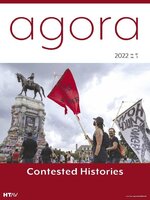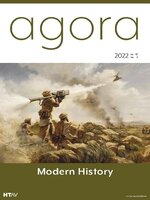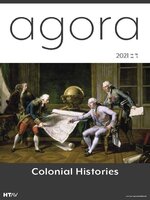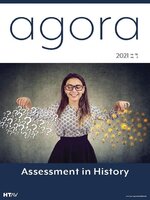Agora is professional reading journal for History teachers. Each issue provides perspectives on a particular theme, from curriculum-focused content to pedagogical practice, along with teaching strategies, classroom activities and educational resources addressing the broader History curriculum.
Reflection
Editorial
Ju-Jitsu’s Role in the Fight for Women’s Suffrage • Ju-jitsu became a weapon in the struggle for women’s empowerment, spreading ‘like wildfire’ across the British Empire to Australia’s suffragette campaign.
Women’s Experiences of Aboriginal Exemption • For Queensland’s Aboriginal women, an exemption certificate could be a ticket to freedom, but there was also a cost—they could no longer have contact with family or community members that were not exempt.
The Leadership of Women in the 1967 Referendum • The 1967 Referendum was a watershed moment in the history of race relations in Australia, but what is often overlooked is how instrumental women were in the development and success of the campaign.
Australian Women Worked for Victory in World War II • The involvement of women in the armed services and in wartime industries changed perceptions of women’s work in ways that helped set Australia on a course towards a more equal society in the late twentieth century.
‘This Was Really Life and Death’: Melbourne Women against the Vietnam War and Conscription • A sense of gross injustice, a conviction that something needed to be done and a realisation that something could be done by people like them are some of the motivations common to the women who were involved in Australia’s anti-Vietnam War and anti-conscription movements in the 1960s and 1970s.
Queen(s) of the Viking Age • The ornate burials of two women within the Oseberg ship reveals the prominent status that women could achieve in the Viking Age.
Théroigne de Méricourt: French Revolution Feminist • Anne-Josèphe Théroigne was a passionate campaigner for women’s rights during the French Revolution whose tragic death in an asylum was later dismissed as the consequence of revolutionary ‘excess’.
The Secret Lives of Soviet Women Writers • Lydia Chukovskaya’s account of her friendship with Anna Akhmatova not only documents the important underground role played by literature in Russia during the Terror and Cold War, but also underlines the historical importance of personal records.
The Female Voice at the Heart of Ancient Greek Religion • One of the most powerful positions in the ancient world was open exclusively to women—the priestess Pythia at the Delphic Oracle.
Challenging Unequal Pay: Women Fruit-pickers and Fruit-packers in 1912 Victoria • Transcripts from an arbitration hearing reveal the stories of rural women fighting for equal pay just a few years after the Harvester Judgement.
Women’s History from the Ladies Lounge to the Daughters of Freedom • Agora interviews Clare Wright about her inspirations in women’s history, the research gaps that remain and her favourite things to read, listen to and watch.
Women, History and Wikipedia Editing • Wikipedia is often the first source of information that teachers and students use, but some class exercises can reveal the gender bias stifling the voices of women in history.
Her Place in History • Her Place Museum’s exhibitions and education resources are focused on the achievements of women, and includes structured lessons plans aligned to the History curriculum.
Women’s Liberation in Australia: From the Cities to the Suburbs • Two new documentaries, Brazen Hussies and Women of Steel, provide vivid accounts of the fight for women’s equality and liberation in Australia.
Teaching Australian Feminist History in Contemporary Contexts • The National Museum of Australia’s Defining Moments...

 Vol 59 No 1 2024
Vol 59 No 1 2024
 Vol. 58 no. 3 2023
Vol. 58 no. 3 2023
 Vol. 58 no. 2 2023
Vol. 58 no. 2 2023
 Vol. 58 no. 1 2023
Vol. 58 no. 1 2023
 Vol. 57 no. 3 2022
Vol. 57 no. 3 2022
 Vol. 57 no. 2 2022
Vol. 57 no. 2 2022
 Vol. 57 no. 1 2022
Vol. 57 no. 1 2022
 Vol. 56 no. 3 2021
Vol. 56 no. 3 2021
 Vol. 56 no. 2 2021
Vol. 56 no. 2 2021
 Vol. 56 no. 1 2021
Vol. 56 no. 1 2021
